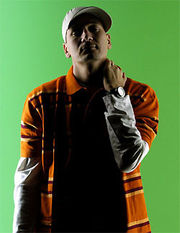Many fans consider Christian hip hop music to be more innovative than the secular variety (thus the tagline of Factors of the Seven by Grits, "the most innovative hip hop in the industry"), because Christian hip hop artists generally sample other songs sparingly, and when they do they typically choose songs that aren't sampled often. John Reuben has friends who play various musical instruments, and uses their assistance as opposed to samples. He is even famous for having a live backing band. Christian hip hop is decidedly more "experimental" than secular hip hop as well, with more usage of acoustic and electric guitars, synthesizers and other instruments that are somewhat uncommon in hip hop. Many artists and bands, however, sample regularly as in mainstream hip hop, and some run into copyright trouble, such as Mars ILL, whose Pro*Pain album was delayed for a long amount of time by Gotee Records due to unlawful use of samples. "It's not so much that Pro*Pain is any more sample-based than any other project, we were just a little laid back in how we approached it initially," says band member Dust. [1]
Contents |
History
Stephen Wiley was the first artist with a commercially released and distributed gospel rap cassette with his 1985 tape called Bible Break (Rap on the Road video, 1991 StarSong Communications, Nashville, TN). Also, a young Christian emcee known as D-Boy was killed in 1991 in Texas for taking youth from gangs and converting them to Christianity. Some consider him the first Christian emcee martyr. dc Talk was perhaps the first wide success among Christian hip hop groups with tobyMac later rising to prominence.
Reaction
 KJ-52 is among the most controversial Christian
emcees.
KJ-52 is among the most controversial Christian
emcees.
Christian hip hop has a history of being dismissed by churches worldwide as sacrilegious, or devil music. No money, no support, and no funded albums were the experience of many artists, but similar to contemporary Christian music many see it as being on the brink of mainstream success.
One of the most notable mainstream reactions to Christian hip hop was to KJ-52 and his single "Dear Slim," which was written to Eminem in an attempt to convert the artist to Christianity. The song became famous and controversial among Eminem fans when it was featured on the hit show Total Request Live. It was then that KJ-52 began to receive hate mail (including death threats) from Eminem's followers, though the song is not a "diss" according to KJ-52. This also lead to the single being panned on VH1, an issue the artist addressed in his song "Washed Up."
There has also been increased church acceptance with some congregations having hip hop-themed worship. Much like other forms of mainstream-style Christian music such as Christian metal and punk, it is often accepted by youth pastors and others, as many artists and groups such as LA Symphony create music with quality widely considered to be on par with that of secular hip hop, which often attracts non-believing fans, and many times, converts such audiences to Christianity.
External links
- Article about Christian reggaeton
- Sphere of Hip Hop
- Sphere of Hip Hop MP3
- Rapzilla
- Dasouth
- FEED Magazine
- Hip Hop for the Soul
- Holy Hip Hop
- Urban Rebirth
- Holy Culture Mixtape Radio
- ALR Holy Hip Hop & Urban Gospel Radio
- Christian hip hop charts at SoundClick
| Hip hop/Rap |
| DJing (Turntablism) - History (Roots ) |
| Genres |
| African - American (East - West - South ) |
| Abstract - Alternative - Chopped & Screwed - Christian - Country-rap - Crunk - Electro - Electro hop - Freestyle music - Gangsta - G-funk - Ghettotech - Golden age - Hardcore - Hip hop soul - Hip house - Horrorcore - Hyphy - Instrumental - Jazz rap - Latin rap - Miami bass - Mobb - Neo soul - Nerdcore - New jack swing - Old school - Pop rap - Rapcore - Ragga - Reggaeton - Snap music - Urban Pasifika |




 216.73.216.133
216.73.216.133 User Stats:
User Stats:
 Today: 0
Today: 0 Yesterday: 0
Yesterday: 0 This Month: 0
This Month: 0 This Year: 0
This Year: 0 Total Users: 117
Total Users: 117 New Members:
New Members:
 216.73.xxx.xxx
216.73.xxx.xxx
 Server Time:
Server Time: